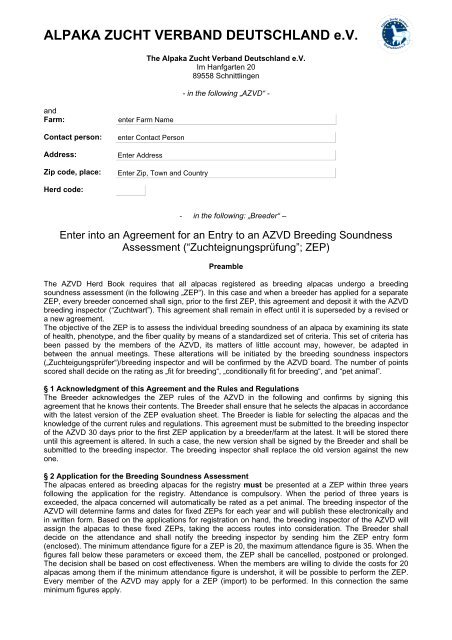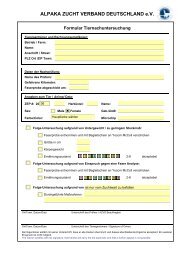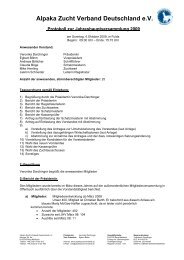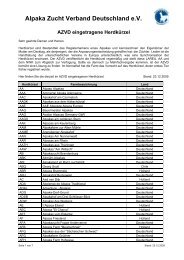Vertrag zur Anmeldung einer - Alpaka Zucht Verband Deutschland eV
Vertrag zur Anmeldung einer - Alpaka Zucht Verband Deutschland eV
Vertrag zur Anmeldung einer - Alpaka Zucht Verband Deutschland eV
You also want an ePaper? Increase the reach of your titles
YUMPU automatically turns print PDFs into web optimized ePapers that Google loves.
ALPAKA ZUCHT VERBAND DEUTSCHLAND e.V.<br />
and<br />
Farm:<br />
Contact person:<br />
Address:<br />
Zip code, place:<br />
Herd code:<br />
The <strong>Alpaka</strong> <strong>Zucht</strong> <strong>Verband</strong> <strong>Deutschland</strong> e.V.<br />
Im Hanfgarten 20<br />
89558 Schnittlingen<br />
- in the following „AZVD“ -<br />
- in the following: „Breeder“ –<br />
Enter into an Agreement for an Entry to an AZVD Breeding Soundness<br />
Assessment (“<strong>Zucht</strong>eignungsprüfung”; ZEP)<br />
Preamble<br />
The AZVD Herd Book requires that all alpacas registered as breeding alpacas undergo a breeding<br />
soundness assessment (in the following „ZEP“). In this case and when a breeder has applied for a separate<br />
ZEP, every breeder concerned shall sign, prior to the first ZEP, this agreement and deposit it with the AZVD<br />
breeding inspector (“<strong>Zucht</strong>wart”). This agreement shall remain in effect until it is superseded by a revised or<br />
a new agreement.<br />
The objective of the ZEP is to assess the individual breeding soundness of an alpaca by examining its state<br />
of health, phenotype, and the fiber quality by means of a standardized set of criteria. This set of criteria has<br />
been passed by the members of the AZVD, its matters of little account may, however, be adapted in<br />
between the annual meetings. These alterations will be initiated by the breeding soundness inspectors<br />
(„<strong>Zucht</strong>eigungsprüfer“)/breeding inspector and will be confirmed by the AZVD board. The number of points<br />
scored shall decide on the rating as „fit for breeding“, „conditionally fit for breeding“, and “pet animal”.<br />
§ 1 Acknowledgment of this Agreement and the Rules and Regulations<br />
The Breeder acknowledges the ZEP rules of the AZVD in the following and confirms by signing this<br />
agreement that he knows their contents. The Breeder shall ensure that he selects the alpacas in accordance<br />
with the latest version of the ZEP evaluation sheet. The Breeder is liable for selecting the alpacas and the<br />
knowledge of the current rules and regulations. This agreement must be submitted to the breeding inspector<br />
of the AZVD 30 days prior to the first ZEP application by a breeder/farm at the latest. It will be stored there<br />
until this agreement is altered. In such a case, the new version shall be signed by the Breeder and shall be<br />
submitted to the breeding inspector. The breeding inspector shall replace the old version against the new<br />
one.<br />
§ 2 Application for the Breeding Soundness Assessment<br />
The alpacas entered as breeding alpacas for the registry must be presented at a ZEP within three years<br />
following the application for the registry. Attendance is compulsory. When the period of three years is<br />
exceeded, the alpaca concerned will automatically be rated as a pet animal. The breeding inspector of the<br />
AZVD will determine farms and dates for fixed ZEPs for each year and will publish these electronically and<br />
in written form. Based on the applications for registration on hand, the breeding inspector of the AZVD will<br />
assign the alpacas to these fixed ZEPs, taking the access routes into consideration. The Breeder shall<br />
decide on the attendance and shall notify the breeding inspector by sending him the ZEP entry form<br />
(enclosed). The minimum attendance figure for a ZEP is 20, the maximum attendance figure is 35. When the<br />
figures fall below these parameters or exceed them, the ZEP shall be cancelled, postponed or prolonged.<br />
The decision shall be based on cost effectiveness. When the members are willing to divide the costs for 20<br />
alpacas among them if the minimum attendance figure is undershot, it will be possible to perform the ZEP.<br />
Every member of the AZVD may apply for a ZEP (import) to be performed. In this connection the same<br />
minimum figures apply.
ALPAKA ZUCHT VERBAND DEUTSCHLAND e.V.<br />
§ 3 Costs of the ZEP<br />
The Breeder shall bear all costs in connection with the ZEP. The costs listed in the following apply<br />
for members of the AZVD. For non-members twice as much will be invoiced.<br />
1. ZEP in Germany<br />
The costs for a ZEP in Germany are 80.00 EUR plus VAT for a minimum number of 20 alpacas.<br />
Should less alpacas be entered, the Breeder shall pay the fees for at least 20 alpacas. When the<br />
attendance figure exceeds 35 or when the access route is 400 km or more, the breeding inspector<br />
team must stay overnight. After the ZEP, the Breeder/Breeders will be billed for the costs of the<br />
overnight stay in a medium-class hotel (up to 80.00 EUR) as well as expenses (flat sum 30.00<br />
EUR/day), on a pro-rata basis, if applicable.<br />
2. ZEP in Europe with the Exception of Germany<br />
The costs for a ZEP in Europe with the exception of Germany are 80.00 EUR plus overnight<br />
expenses in a medium-class hotel (up to 100.00 EUR per breeding inspector), travel expenses (0.30<br />
EUR per km or economy flight ticket plus transfer per breeding inspector), and expenses (flat sum<br />
40.00 EUR per breeding inspector and ZEP-day) for at least two overnight stays. This shall also<br />
apply for a minimum number of 20 alpacas. Should less than 20 alpacas be entered, the Breeder<br />
shall pay the fees for a minimum of 20 alpacas. When more than 35 alpacas are entered, the<br />
breeding inspector team must stay one more night.<br />
3. ZEP Outside of Europe<br />
The costs for a ZEP outside of Europe are 80.00 EUR plus overnight expenses in a medium-class<br />
hotel (up to 120.00 EUR per breeding inspector), travel expenses (economy flight ticket plus transfer<br />
per breeding inspector), and expenses (flat sum 50.00 EUR per breeding inspector and ZEP-day) for<br />
a minimum of three overnight stays.<br />
This shall also apply for a minimum number of 20 alpacas. Should less than 20 alpacas be entered,<br />
the Breeder shall pay the fees for a minimum of 20 alpacas.<br />
Payments shall be made in advance to the AZVD, 14 days prior to the ZEP at the latest. The actual<br />
additional expenses (travel, fee, expenses) will be billed separately upon completion of the ZEP. All fees and<br />
expenses shall be paid, irrespective of the result and even if an alpaca is not presented. The advance<br />
payments will not be refunded. In the case of non-presentation of an alpaca the expenses shall nevertheless<br />
have to be paid, since the funding is at risk when the minimum attendance figure is undershot. The alpaca in<br />
question may be presented free of charge at a later date.<br />
§ 4 Place and Period of the ZEP<br />
By the end of a calendar year, the breeding inspector will announce fixed dates for ZEPs. Depending on<br />
season and access routes, every breeder may enter alpacas for these dates. In addition, every breeder may<br />
apply for a separate ZEP (e.g. prior to or following an import) as long as the minimum attendance figure of<br />
20 alpacas or payment for 20 alpacas is guaranteed. In the case of ZEPs beside the fixed ZEPs, the<br />
following shall apply:<br />
The Breeder shall notify the AZVD about the ZEP in advance, furnishing the place, the requested date, and<br />
the number of the alpacas to be examined. There shall be a period of at least 60 days between the<br />
application and the requested additional ZEP date in Germany and in Europe with the exception of<br />
Germany; and at least 90 days for ZEPs outside of Europe. The AZVD will not accept any responsibility that<br />
the requested dates will be kept. We recommend that a period of time be specified instead of a single date.<br />
§ 5 Requirements for the Alpacas<br />
For every alpaca, registration with the AZVD shall have been applied for 14 days before the begin of the<br />
ZEP at the latest. The Breeder shall send the ZEP entry form to the AZVD breeding inspector 30 days prior<br />
to the begin of the ZEP at the latest (in the case of the first ZEP, this agreement, too). The data furnished by<br />
the Breeder shall comprise: Name of the alpaca, ear tag number, age, sex, color, number of microchip,<br />
breed (huacaya, suri). The Breeder shall ensure that the alpacas to be examined shall meet the following<br />
requirements:<br />
- Age of the Alpaca:<br />
The minimum age for a ZEP is the completion of the first year of the alpaca’s life.
ALPAKA ZUCHT VERBAND DEUTSCHLAND e.V.<br />
- Body Size and Weight:<br />
According to the size and weight table. Underweight alpacas have to be weighed and measured again<br />
6 months after the ZEP and/or upon completion of their second year. At the same time, a new fiber<br />
sample shall be taken from the alpaca concerned. A breeding soundness inspector in the presence of<br />
a witness will carry out this re-examination. This witness may be a member of the AZVD, a regional<br />
breeding inspector or a veterinarian. The witness must not be related to or transact business with the<br />
owner of the alpaca concerned. The owner of the alpaca will be billed for the costs.<br />
- Fiber Length:<br />
The fiber length of an unshorn alpaca must be at least 3 cms. With a shorn alpaca, an unshorn area of<br />
at least 10 x 10 cms must remain at the center of the left flank, its upper edge approx. 10 cms below<br />
the dorsal midline. When the fiber length falls below this value, the alpaca cannot be examined.<br />
- Identification:<br />
The alpacas must be positively identifiable by means of the microchip. The Breeder is responsible for<br />
the verification by indicating location and type of the microchip. When the chip cannot be located, the<br />
alpaca will not be examined any further. When microchips without the ISO standard have been used<br />
an appropriate scanner shall be made available.<br />
- Extra Teats:<br />
As yet, there is no exact definition from the scientific point of view regarding an abnormal teat<br />
formation. Therefore the AZVD defines the defect such that an extra teat will only be considered as<br />
such if it is in evidence as a functioning teat and is located within an imaginary line of 5 cms parallel to<br />
both lines and has glandular tissue. Since the latter cannot be determined without any doubt during an<br />
assessment in the field (ZEP), the examining veterinarian is authorized to order the tissue to be reexamined.<br />
The result of this examination shall decide about the disqualification. The Breeder may also<br />
arrange for such an examination prior to the ZEP. The relevant certificate shall be enclosed with the<br />
entry. When a corresponding scar is found during the ZEP without a certificate having been submitted,<br />
this will be considered an attempt of deception. The alpaca will then be treated as if it has an extra teat<br />
at this location.<br />
- Dental Care:<br />
For an assessment of the position of the jaw, the distance between the upper edge of the incisors and<br />
the dental pad is measured. The teeth of alpacas with a slightly overshot jaw may protrude past the<br />
front of the palate when the alpacas are still young which requires trimming the teeth from the animal<br />
welfare point of view alone. The breeder is responsible for the dental care. Failing this, excessively<br />
long teeth may result in a deduction of scores. Alpacas during teeth replacement may be presented<br />
without any problems.<br />
- Pregnancy:<br />
The AZVD does not wish any pregnant females at a ZEP to eliminate the risk of a premature abortion<br />
of the pregnancy caused by the stress brought about by the transport or handling. Presenting a<br />
pregnant female at a ZEP is in the Breeder’s sole responsibility. The AZVD and the breeding<br />
inspectors decline any and all responsibility for any resulting losses.<br />
- Injuries:<br />
The ZEP collects animal data that will be the basis for conclusions of possibly hereditary congenital<br />
defects. This does not apply to injuries. The Breeder is required to furnish a veterinary certificate<br />
documenting both the course of the disease and/or the injury and its treatment to prevent the<br />
disqualification of the alpaca due to an injury. This certificate shall be submitted together with the<br />
application for the alpaca for the ZEP.<br />
§ 6 Preparation and Performance of the ZEP<br />
To guarantee a perfect process on site, the organizer(s)/breeder(s) shall arrange for the following at the<br />
place of the ZEP:
ALPAKA ZUCHT VERBAND DEUTSCHLAND e.V.<br />
1. Transfer for the inspectors from and to the airport to the location of the ZEP<br />
2. Booking of the overnight stay for the inspectors in a medium class hotel<br />
3. Appropriate system of pens, means for weighing, a path of 12x2 m with lateral walls and locations to<br />
catch the alpacas<br />
4. Two persons for recording<br />
5. Experienced livestock owners<br />
6. Microchip scanner (see §5 Identification)<br />
7. Calibrated scales for weighing the alpacas<br />
8. Clippers/shears for cutting the fiber sample<br />
9. Unrestricted access for the inspectors and any further involved persons (regional breeding<br />
inspector) to the place of the ZEP taking the national laws and regulations into account<br />
Teams of three persons will always carry out the ZEP. Two phenotype breeding soundness inspectors and<br />
one veterinarian who are trained to the ARI Screening Standards and will be appointed by the AZVD<br />
breeding inspector only, will perform the ZEP. A ZEP that has been ordered and performed by a breeding<br />
soundness inspector on his own account will result in the deprivation of the breeding status of the alpacas<br />
concerned and the withdrawal of the breeding soundness inspector license. The Breeder has no bearing on<br />
which breeding soundness inspectors will be assigned for the ZEP concerned. The AZVD breeding<br />
inspector will assign the breeding soundness inspectors, taking any conflicts of interest into account. At<br />
present, a ZEP team is able to screen up to 35 alpacas a day. Should this number be exceeded, the written<br />
approval by the breeding inspector will be required.<br />
The AZVD breeding inspector will forward all applicable ZEP evaluation sheets and labeled plastic bags for<br />
the fiber samples to the ZEP team in time. The inspector does not know the names of the alpacas, nor their<br />
owners. The examination is done anonymously. The ZEP may be performed under survey of the breeding<br />
inspector or a regional breeding inspector.<br />
The owners/breeders/importers of the alpacas may watch the ZEP, keeping a minimum distance of 10<br />
meters. Owners/breeders/importers MAY NOT approach the breeding soundness inspectors (phenotype)<br />
directly. If a disqualifying criterion is found, a regional breeding inspector will be present with a ZEP within<br />
Germany who will act as an intermediary between breeding soundness inspectors and owner and will inform<br />
the latter about the defect. If there is no regional breeding inspector present or when the ZEP is performed<br />
abroad, the veterinarian will undertake this task.<br />
§ 7 Outcome of the ZEP<br />
The ZEP evaluation sheets in their current version are the basis of the ZEP. The current version is available<br />
on the website of the AZVD (www.alpakazuchtverband.de) and from the AZVD breeding inspector. We<br />
assume that all AZVD members have a knowledge of the topics:<br />
1. Veterinary examination,<br />
2. phenotypic examination,<br />
3. fiber characteristics, and<br />
4. fiber analysis<br />
as well as the requirements described thereunder.<br />
Alpacas that reach a score of 80 or more based on the phenotype examination and fiber analysis and score<br />
a minimum of 40 phenotype points and 30 fiber points will be rated as:<br />
Fit for breeding<br />
Alpacas that reach a score of 50 to 79 points based on the phenotype examination and fiber analysis and<br />
score a minimum of 25 phenotype points and 25 fiber points will be rated as:<br />
“Conditionally fit for breeding“.<br />
Alpacas that reach a score of less than 50 points based on the phenotype examination and fiber analysis will<br />
be rated as:<br />
“Pet animal“.<br />
The outcome may only be published after the fiber sample has been analyzed and the outcome has been<br />
submitted to the breeding inspector. The team of breeding soundness inspectors at site is responsible for<br />
forwarding the fiber samples. The AZVD breeding inspector is responsible for the documentation and for<br />
publishing the data. The AZVD breeding inspector will inform the owners about the outcome of the ZEP in<br />
the form of a summary, if necessary in the form of a table, as soon as the AZVD has been refunded all the
ALPAKA ZUCHT VERBAND DEUTSCHLAND e.V.<br />
costs that were actually incurred. The individual points scores will be published electronically only, their full<br />
extent (linear description AND detailed scores) will be revealed to the owner only. Any printout of the<br />
outcome will be invoiced to the owner/applicant at 1.00 EUR per page plus VAT: The entry into the alpaca<br />
pass will be done after it has been sent to the AZVD breeding inspector. The regional breeding inspectors<br />
are the supervisory body for the breeding inspector and will check, at least once a year, whether the<br />
evaluation sheets have been transferred without any errors to the herd book software.<br />
Every alpaca may be presented only once at a ZEP. Should a further examination be required after the ZEP<br />
(weighing, measuring, fiber analysis), the owner will be informed about the period when the further<br />
examination will be performed. The Breeder is responsible for meeting this alternative examination date and<br />
shall bear all costs. This does not apply to further examinations that are required due to system errors that<br />
will not be at the Breeder’s expense.<br />
§ 7 Appeal Clause<br />
Should an owner not agree with details of the assessment, he is obliged to notify the AZVD breeding<br />
inspector in writing within 14 days upon notification of the outcome. The appeal clause applies only to:<br />
1. Fiber Analyses<br />
A breeder may have another fiber sample taken against payment of an expense allowance of 15.00<br />
EUR plus travel expenses. Sampling and handling of the sample will be organized by the AZVD<br />
breeding inspector; it will be performed by a breeding soundness inspector. All costs will be to the<br />
Breeder’s account.<br />
2. Extra Teats<br />
Should a breeder doubt the opinion of the examining veterinarian with regard to extra teats, he may<br />
request an expert opinion via the AZVD breeding inspector. An independent laboratory will be<br />
commissioned to examine an explant. All costs will be to the Breeder’s account. Depending on the<br />
amount of the anticipated costs, the Breeder shall make a part payment to the account of the AZVD.<br />
The outcome of the ZEP shall be considered preliminary until all evaluation documents of the alternative<br />
examination have been received. The final outcome of the ZEP is not appealable.<br />
§ 8 Conflicts of Interest<br />
To prevent conflicts of interest, explicit rules of conduct for breeders, breeding soundness inspectors, and<br />
board of the association are required. A central control by the breeding inspector is required to guarantee<br />
the anonymity of the ZEP. Any direct personal contact between Breeder and breeding soundness inspector<br />
(phenotype) is forbidden. Breeder and breeding soundness inspector must not have any common economic<br />
interest in the alpacas to be examined nor may the breeding soundness inspectors buy alpacas they have<br />
examined. The AZVD breeding inspector shall be informed about any possible conflicts of interest in time<br />
before a ZEP so that he is able to re-assign the breeding soundness inspectors. Any violation of this<br />
provision will automatically result in the deprivation of the breeding status of all alpacas of the breeder<br />
concerned that were examined by this breeding soundness inspector, and, in case of recurrence, to the<br />
withdrawal of the license of the breeding soundness inspector concerned. The ZEP may be repeated with<br />
costs. Compliance of this provision will be supervised electronically within the scope of the AZVD herd book<br />
software. In addition, the following principle applies: Knowledge only when necessary. The breeding<br />
soundness inspectors must not make known results and/or partial results of individual alpacas. The<br />
breeders shall not send any enquiries to this end to the breeding soundness inspectors. The breeding<br />
inspector only, and only after receipt of all partial results will answer enquiries.<br />
§ 9 Liability<br />
Breeding soundness inspectors and AZVD decline any liability for the planning, performance, result, or any<br />
economic losses. The AZVD declines any liability for damage to the equipment at the place of the ZEP as<br />
well as to the presented alpacas.<br />
§ 10 Place of Jurisdiction<br />
The place of jurisdiction is the registered office of the AZVD, provided law permits an agreement of<br />
jurisdiction.
ALPAKA ZUCHT VERBAND DEUTSCHLAND e.V.<br />
§ 11 Validity<br />
This agreement must be signed by all AZVD members or other persons entering alpacas once prior to the<br />
begin of the ZEP and must be forwarded to the AZVD breeding inspector for filing, until this agreement is<br />
superseded by a new agreement. Thus only the ZEP entry form must be forwarded with the next entry. In<br />
case this agreement is changed, it must be sent in again. Changes to or amendments of this agreement<br />
must be in writing. The Breeder/sender is responsible for filing a copy. This agreement and the rules and<br />
regulations will become effective on August 1 st , 2006. Please check the version of your executed copy<br />
against the version published on the Internet.<br />
§ 12 Miscellaneous<br />
Should individual provisions of this agreement be or become invalid in whole or in part, this shall not affect<br />
the validity of the remaining provisions. The parties to the agreement agree to substitute the invalid provision<br />
by a valid provision that is as close to the intended subject matter of the invalid one as possible.<br />
__________________________________ ___________________________________<br />
Place, date Place, date<br />
__________________________________ ___________________________________<br />
AZVD / President / Vice President Breeder/Person Applying for Entry of Alpaca






